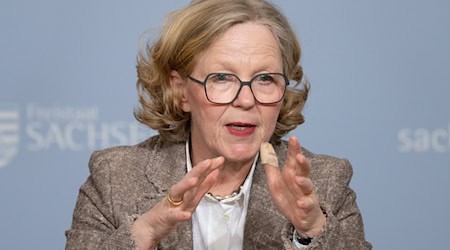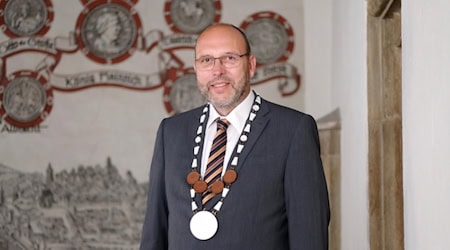The interior ministers of the federal and state governments are discussing more protection for elected officials and other politically active people following violent attacks such as the one on Saxon SPD European politician Matthias Ecke. Federal Interior Minister Nancy Faeser (SPD) and the heads of the state ministries will meet in a video conference at 6.00 pm. The Chairman of the Conference of Interior Ministers, Brandenburg's Head of Department Michael Stübgen (CDU), had invited them to the meeting at Faeser's suggestion. The aim was to discuss possible measures to prevent similar attacks, according to the Brandenburg Ministry of the Interior.
Ecke is the Saxon SPD lead candidate for the European elections and was beaten up by four teenagers aged 17 and 18 on Friday when he wanted to put up election posters for his party. The Saxony State Criminal Police Office (LKA) believes that at least one of the suspects in the attack belongs to the right-wing spectrum. The four alleged perpetrators have been identified. The incident caused nationwide horror. In recent days, there have also been attacks on politicians from the Greens and the AfD.
Saxony to adopt Bundesrat initiative
On Tuesday morning, the Saxon cabinet intends to adopt a Bundesrat initiative to toughen penalties for attacks on politicians and election workers. State Interior Minister Armin Schuster announced this on Monday evening on ARD's "Tagesthemen" program. We need a new criminal offence in the Criminal Code for threatening public officials, elected representatives and volunteers," said the CDU politician.
Saxony's Justice Minister Katja Meier (Greens) emphasized in the "Tagesspiegel" that a paragraph should be introduced into the Criminal Code that criminalizes the "influencing of state decision-makers". Meier was optimistic that the other federal states and the federal government would support Saxony's initiative. "There is a lot of support among the state interior ministers," she said. Schuster called on Federal Minister of Justice Marco Buschmann (FDP) to cooperate in this regard.
Networking of police and volunteers
Schuster also announced the establishment of a communication channel in the Saxon Ministry of the Interior where spontaneous actions can be reported. Volunteers often go off spontaneously, which is why it is difficult for the police to protect them. "We want to get closer to the election workers, but they have to navigate us a bit," said Schuster. There is already a contact point at the LKA for planned election campaigns. It had been set up for the parties so that the police could prepare for this.
Schuster expects the judiciary to take into account the fact that this is not only a case of dangerous bodily harm, but also a serious attack on free elections. "The rule of law must show its teeth here," emphasized the CDU politician.
Stricter penalties demanded for attacks during election campaigns
Federal Health Minister Karl Lauterbach also called for stricter penalties for threatening politicians. He told the newspaper "Neue Westfälische" (Tuesday) that "laws could be passed and the penalties significantly increased to punish violence against local politicians more severely. You have to work with deterrence when it comes to penalties. If we want local politics to still function, then we have to protect people."
Brandenburg's Minister President Dietmar Woidke (SPD) called for a signal of strength ahead of the conference of interior ministers. "Being afraid or being intimidated would be exactly the wrong signal," Woidke, who is also the state chairman of the Brandenburg SPD, told the German Press Agency. "That is exactly what must not happen." The open discourse must continue. Woidke is calling for a consistent response from the interior ministers: "I expect a signal that the existing legal framework will be fully utilized, that we will perhaps also come to faster procedures in this area," he told RBB.
Politicians from the CDU/CSU and the Greens called on the conference of interior ministers to also ensure better protection for campaigners by the police. "In some places, not only events, but also the display of election posters will have to be closely coordinated with the police and, if necessary, accompanied by them," said Andrea Lindholz (CSU), deputy chairwoman of the CDU/CSU parliamentary group, to dpa. It should not remain with statements of concern from the interior ministers. She brought a possible tightening of criminal law into play. "Politicians are particularly protected against insults with an increased penalty, but not against bodily harm." This should also be put to the test.
The Parliamentary Secretary of the Green parliamentary group in the Bundestag, Irene Mihalic, urged the heads of the interior ministries not to part ways after their conference without concrete agreements. Above all, the ministers should discuss "how the federal and state governments can organize sufficient police forces to adequately secure upcoming election campaign events". The Green politician called for "a precise analysis of the possible mobilization of such attacks and a clear concept for suitable protective measures".
The German Association of Cities also considers a tightening of criminal law to be appropriate. President Markus Lewe told the newspapers of the Funke media group (Tuesday): "Stalking, marches in front of residential buildings and threats such as 'We know where you live and where your children go to school' must be punishable. That belongs in the penal code." Lewe, who is the Lord Mayor of Münster, also called for specialized public prosecutors to be able to "act faster and more precisely".
The IMK Chairman Stübgen warned against exaggerated expectations of the police. "Violence and agitation in our society do not only affect domestic policy. Brutalization and disinhibition are a problem for society as a whole," the CDU politician told the "Rheinische Post" (Tuesday). "Anyone who expects the police to be able to solve all problems is misjudging the challenges we face."
Copyright 2024, dpa (www.dpa.de). All rights reserved




